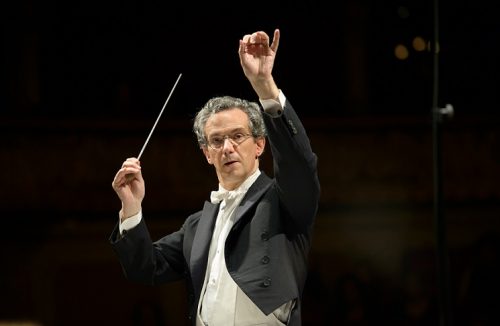 Switzerland Bruckner: Philharmonia Zurich / Fabio Luisi (conductor). Zurich Opera House, 19.6.2021. (JR)
Switzerland Bruckner: Philharmonia Zurich / Fabio Luisi (conductor). Zurich Opera House, 19.6.2021. (JR)

Bruckner – Symphony No.7 in Emajor
It was to have been a performance of Mahler’s mighty Ninth Symphony which signalled the end of Fabio Luisi’s nine-year term as General Music Director at Zurich Opera, but Covid restrictions meant a small orchestra would be required, so the alternative choice fell to Bruckner’s majestic Seventh Symphony. I have to say, I think the change was fortuitous – this was not a farewell to life but the end of a fine, musical era celebrated, rightly, with a grandiose and uplifting work.
It was, of course, a great shame that not more than 100 lucky souls plus a few equally lucky critics were allowed to witness the event live, so Zurich Opera took great trouble and expense to film and stream the event live. The stream is available free of charge as video on demand until the end of this month on the opera house’s website (click here) in 3D Surround Sound.
Neither Bruckner nor his Seventh Symphony need any introduction. The use of four Wagner tubas reminds us that Bruckner revered Wagner, who died half way through the composition of the Adagio so that Bruckner quickly added the Wagner tubas with a suitable funereal theme, adding some appropriate words at the top of the page. The orchestra gave their all – I highlight the clarinettist and timpanist who were both particularly impressive; there were clear signs of more than ample rehearsal, only a few rough edges showed the orchestra’s lack of experience in this repertoire. Luisi has done more than most of his predecessors to improve the quality of the orchestra, bringing them out of the pit onto the stage in a new acoustic shell and even giving them an own new branding, the ‘Philharmonia Zurich’ rather than simply the ‘Orchestra of the Zurich Opera’. Before the Luisi era, the orchestra had, I believe, never played a Mahler or Bruckner symphony, not even a Schubert’s Ninth.
Luisi’s strengths during his time in Zurich were undoubtedly in Italian opera, particularly Verdi and Bellini, but also in some of the German and Central European operas, notably Wozzeck (which in fact he had never before conducted) and Jenůfa. What I had not appreciated was Luisi’s predilection for and consummate skill with Bruckner; his performances of the Fourth, Eighth and Seventh Symphonies will stay in my memory – they were all top notch.
The opera house acoustics are not ideal for such works, with their wide dynamic range, and I was frequently deafened by the brass onslaught; Luisi never held back. The emotional heart of the whole work is where the cymbal crashes, near the end of the slow movement – this was most effectively executed. Luisi skilfully varied his tempi throughout and highlighted small details frequently glossed over by less experienced conductors.
At the end, after the work’s thrilling climax and conclusion, it was left to the Opera’s Director, Andreas Homoki, and the President of the Orchestra Laszlo Szlavik, to make speeches in praise of the outgoing Luisi. He was showered with gifts, flowers, a bowtie in a bright orange box, a boxed set of DVDs and CDs, all his recordings with the orchestra, and a fancy pen with which Homoki expressed the hope that Luisi would sign future conducting contracts with the opera house. In fact, we were told that some projects are already in the pipeline. So this was very much ‘Auf Wiedersehen’ rather than ‘goodbye’ – he will be welcomed back at any time with open arms.
Oddly, Luisi made no speech – he is a reserved, humble man (much in the same way as Bernard Haitink) giving all his considerable energy and attention to the music (just watch his elegant yet energetic conducting style on the livestream if you can).
During his time at the opera, Luisi’s considerable achievement was that he conducted 282 performances (18 were new productions), of which 251 were opera, 31 concerts and 17 concerts on tour.
Luisi will remain with his two orchestras, the Dallas Symphony and the Danish National Symphony; he says that for the next two seasons he will hardly conduct any opera – just one new production and one revival. He will concentrate on the symphonic repertoire until, no doubt, his love of opera grips him once again.
Gianandrea Noseda is Luisi’s successor at Zurich Opera. Andreas Homoki has also announced he will step down as Director in 2025, after the Ring cycle has been completed with Noseda. The hunt for Homoki’s successor has commenced.
John Rhodes
